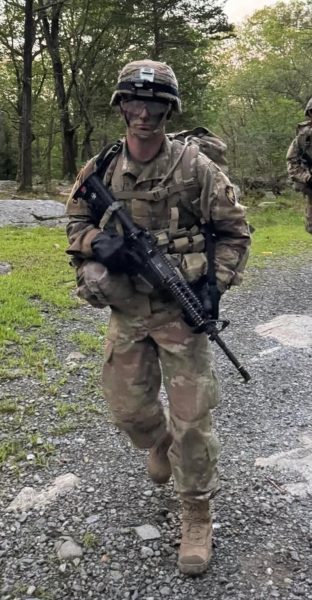
The majority of Menlo graduates head off to college campuses, eager to enjoy their newfound independence, flexible schedules and late-night parties — a select few, however, find themselves drawn to the crisp uniforms, early morning wake-up calls and endless drill formations at one of the five major United States Military Academies.
Although only four students in the past five years have gone on to one of these academies, with rising interest among current students like sophomore Lauren Rukavina and recent commitments from senior Eden Chuang and Parker Brown (‘24), the military academy option is increasingly highlighting that leadership can take many forms beyond the classroom.
Given the demanding schedule, academics and daily workouts, the idea of attending a school like this appeals to only a handful of Menlo students — reserved only for the highly attentive and strong-willed. This is in part true; keeping up with the strictly structured day-to-day life and challenging courses alone test nearly all attendees at some point in their West Point career.
Parker Brown (‘24), a current freshman, or “plebe,” at West Point Military Academy in upstate New York found adjusting to an environment like West Point more difficult than he imagined. “It’s not easy to always have your foot on the pedal,” Brown said. “I thought I was busy at Menlo, and then I [arrived at] West Point and found out that it’s possible to be more busy.”
Despite the difficulty, a select few current Menlo students hope to follow in Brown’s footsteps. Sophomore Lauren Rukavina has her eyes set on attending West Point; she hopes to be pushed to her limits, mentally and physically, all while being in an environment of tradition and community. “West Point has always been the dream,” Rukavina said, referring to the Army quarterback.
Like civilian colleges, students at military academies are given experiences intended to prepare them for careers outside of the U.S. Armed Forces. Students have access to exclusive internships, study abroad opportunities, connections with Fortune 500 companies, the FBI, the White House and much more, all without charge. And although there is a mandatory service requirement post-graduation, many choose to serve longer.
That’s certainly what Rukavina plans to do. “I have always wanted to give back to my community in a meaningful way,” she said. “West Point prepares you for a career dedicated to serving your country while pushing you to be the best version of yourself.”
However, it’s not an easy process to get into these military academies. The extensive application process differs significantly from that of a traditional four-year university. Applicants must receive a senatorial, congressional or vice-presidential nomination, and are also required to pass the notorious mandatory physical test that involves six tasks: a basketball throw, cadence pull-ups or flexed-arm hang (only for females), 40-yard shuttle run, modified sit-ups, push-ups and a one-mile run.
Senior Eden Chuang committed to West Point for swimming during the summer of her junior year, and is set to attend this upcoming fall. According to Chuang, there is a separate portal that all students must access to apply and entirely different essays that make the process more complicated. Chuang’s physical check-up alone took over three hours to complete, along with a required fitness test and an optometrist visit.
Initially, Chuang was apprehensive about applying because the experience is substantially different from her life at Menlo; however, Chuang finds herself looking forward to the beginning of her West Point career. “I am excited to have a purpose beyond myself and [be] part of a team,” Chuang said.
Emilio Simbeck (‘18), a current Surface Warfare Officer, graduated from the Naval Academy and believes that even though these military academies are drastically different from life at Menlo, he thinks that, although it’s stressful, it’s beneficial for young people. “It taught me a lot in the formative years of my life about just showing up every single day and performing no matter what else was going on,” Simbeck said.
Not only does attending an academy teach you how to compartmentalize, but it also teaches you how to work in a team and rely on other people, especially when challenges are thrown your way. “It’s so radically different from what you’re used to at Menlo, at least what I was used to,” Simbeck said.
However, others find that Menlo is, in some ways, similar to their life at a military academy. Menlo’s work to prepare you for college goes far beyond academics, according to Andrew Yagen (‘22), who is a current junior at West Point. “[Menlo] did prepare me really well for the intensity, whereas a lot of people were caught off guard when they came here,” Yagen said.
Yagen says he found himself dealing with a lot more daily school work than at Menlo, but, nevertheless, Menlo’s teachings in time management and accountability helped him thrive.
The journey that you begin once you attend one of these academies not only takes grit and perseverance, but also takes commitment. You have to constantly remind yourself why you’re doing this. “We don’t do it for the money. I definitely don’t. I just do it for our country and for the people who have given so much for us,” Navy pilot RJ Babiera (‘16), a recent graduate from the Naval Academy, said.
